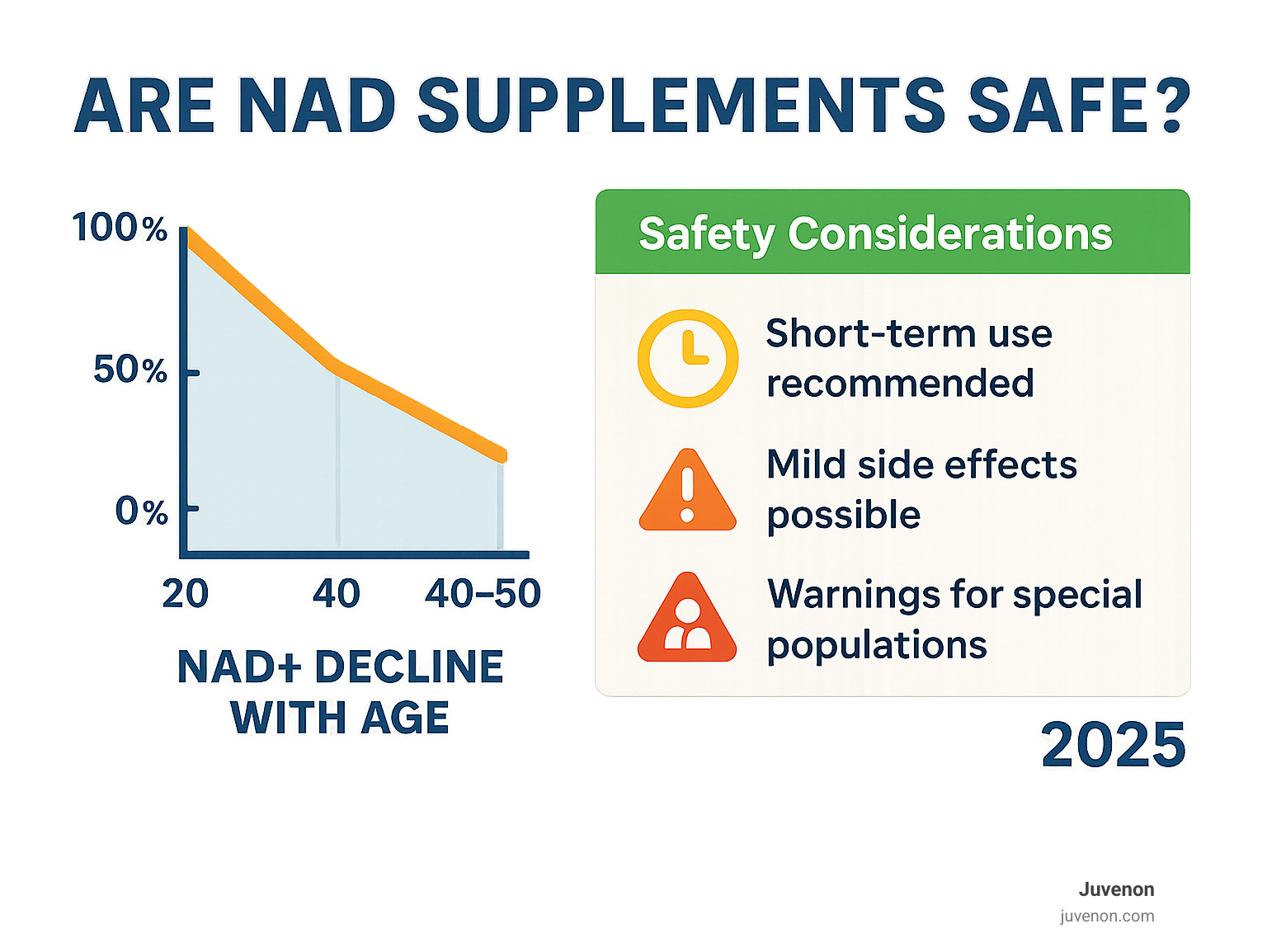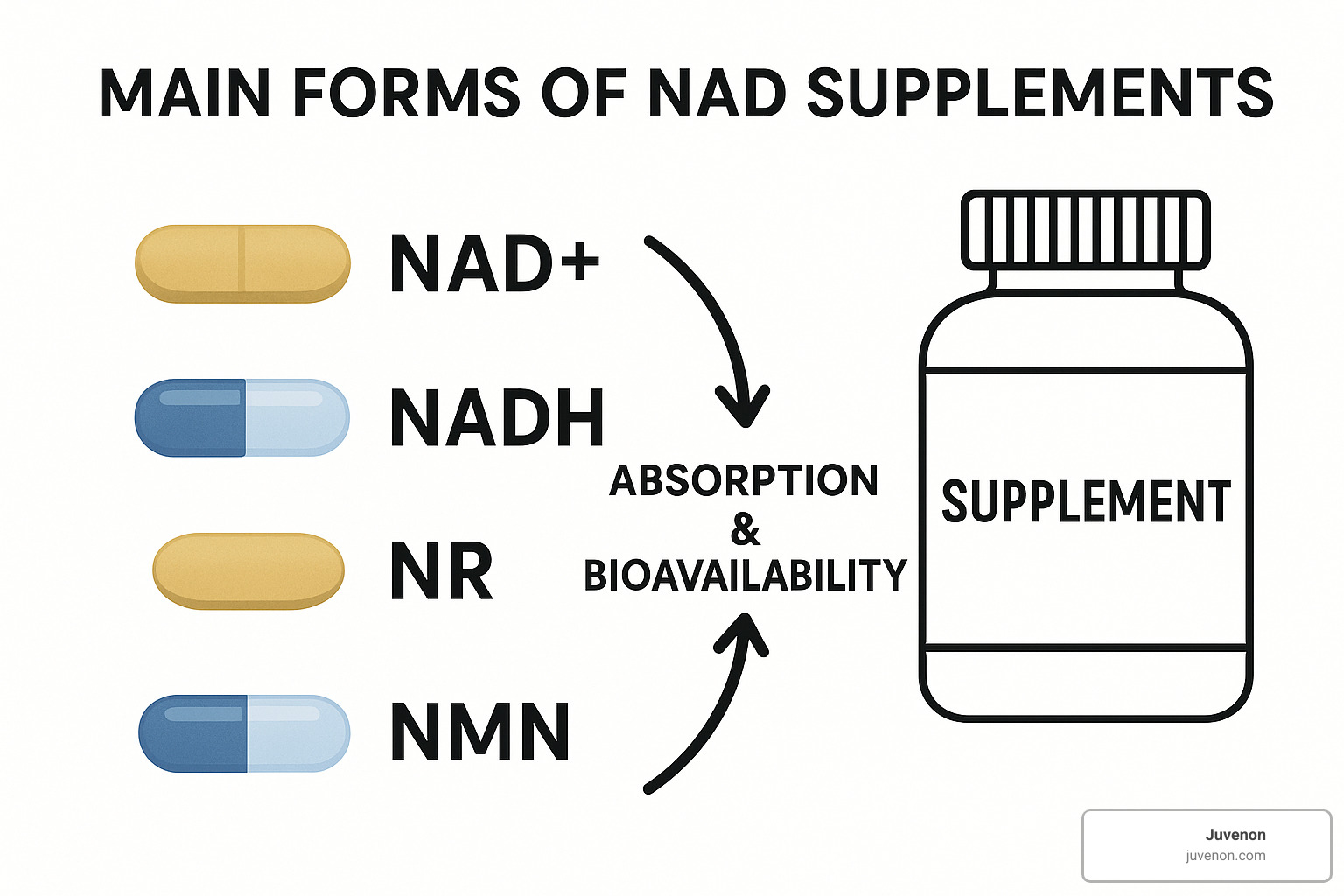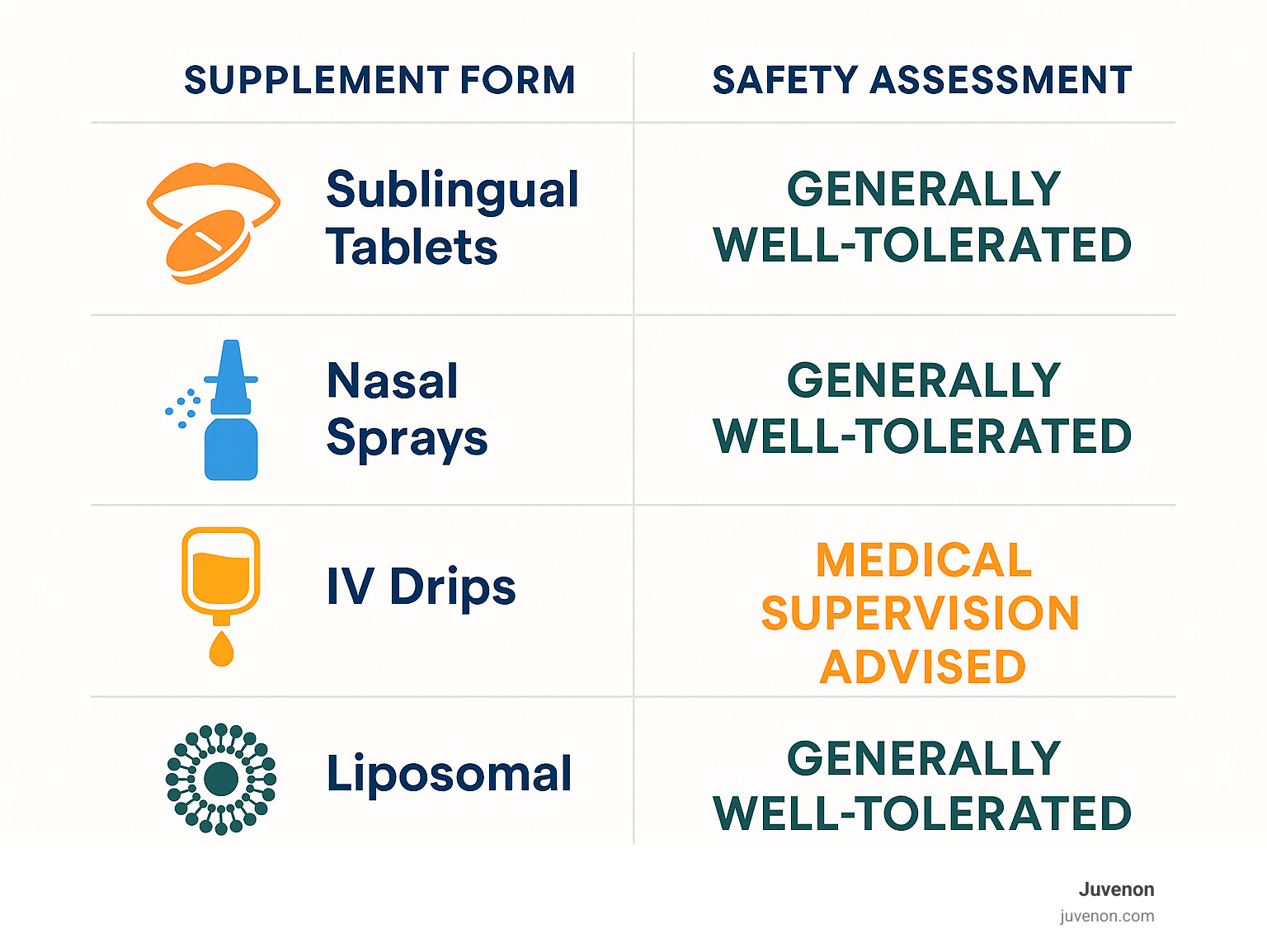
Are NAD supplements safe for most healthy adults? Based on current clinical evidence, NAD supplements appear to be generally well-tolerated when used short-term (up to 12 weeks) at recommended doses. Here's what you need to know:
Safety Profile Summary:
- Generally safe for healthy adults in clinical trials
- Mild side effects reported: nausea, headache, flushing, fatigue
- Short-term use (up to 12 weeks) has the strongest safety data
- Avoid during pregnancy and breastfeeding due to insufficient data
- Caution advised for people with cancer, liver/kidney conditions
Common Dosing Ranges Studied:
- NR (Nicotinamide Riboside): 100-2000 mg daily
- NMN (Nicotinamide Mononucleotide): 250-900 mg daily
- NADH: 5-10 mg daily
With the anti-aging supplement market projected to reach $83.2 billion by 2027, NAD supplements have become increasingly popular. However, as one systematic review of 489 participants found, while these supplements can raise blood NAD+ levels, "larger and longer studies are needed to determine whether NAD supplementation translates to long-term anti-aging health benefits."
The safety question becomes more complex when you consider that 64% of popular NMN supplements tested contained no detectable NMN according to ConsumerLab testing. This highlights the importance of choosing quality products from reputable manufacturers.
I'm Michelle M. Henson, Head of Copywriting and Legal Compliance Editor at Juvenon, where I ensure our content meets strict safety and regulatory standards while helping people understand complex supplement research. My two decades of experience in health content has taught me that the question are NAD supplements safe requires looking beyond marketing claims to examine actual clinical evidence.

Basic are nad supplements safe glossary:
- boost-your-health-exploring-the-benefits-of-nad-supplements
- choosing-the-best-resveratrol-and-nad-supplements
- nad-supplementation-how-to-get-it-right
Decoding NAD: What It Is and How It Fuels the Body
Picture NAD as your body's master key - one that opens up hundreds of different cellular processes that keep you feeling energized and healthy. NAD (nicotinamide adenine dinucleotide) isn't just another supplement buzzword; it's a coenzyme that participates in over 500 enzymatic reactions throughout your body.
Every time you breathe, think, or move, NAD is working behind the scenes. It plays a starring role in cellular energy production, helping transform the food you eat into ATP - the fuel that powers everything from your heartbeat to your ability to remember where you left your keys.
But NAD's resume doesn't stop at energy production. This remarkable molecule is also essential for DNA repair, keeping your genetic code intact as cells divide and renew themselves. It helps maintain your circadian rhythm, and activates sirtuins - proteins that scientists often call "longevity genes" because they help protect against cellular damage that accumulates with age.
When you're wondering are NAD supplements safe, it helps to understand that you're essentially asking about supporting a system your body already depends on completely.
NAD vs NADH – the cellular seesaw
Think of NAD+ and NADH as dance partners in the world's most important cellular ballet. NAD+ is the oxidized form that's ready to accept electrons, while NADH is the reduced form that carries those electrons around like a cellular delivery service.
This constant switching between NAD+ and NADH creates what scientists call the electron transport chain in your mitochondria. It's like a perfectly choreographed assembly line that ultimately produces ATP - your cells' preferred energy currency.
Your body needs both forms for different jobs. NAD+ activates sirtuins and supports DNA repair processes, while NADH feeds directly into energy production. When this delicate balance gets disrupted - whether through aging, stress, or lifestyle choices - your cellular machinery starts running less efficiently.
Why NAD levels fall with age
Research shows that NAD+ levels can drop by nearly 50% by your 40s. This isn't just a number on a lab report - it translates to real changes in energy, mental clarity, and overall vitality.
Several factors contribute to this decline. The enzyme CD38 becomes more active as we age, essentially consuming NAD+ faster than our cells can produce it. Chronic inflammation also accelerates NAD+ consumption, while our cells' ability to manufacture NAD+ from precursors becomes less efficient.
Lifestyle factors can speed up this process dramatically. Poor sleep quality, excessive alcohol consumption, chronic stress, and diets high in processed foods all contribute to faster NAD+ depletion. The good news? Understanding these factors means you can take steps to slow the decline.
The Spectrum of NAD Supplements: NAD+, NADH, NR, NMN

Walking into the NAD supplement world can feel like entering a confusing alphabet soup. You'll see NAD+, NADH, NR, and NMN plastered across bottles and websites, each claiming to be the best way to boost your cellular energy. They're all trying to accomplish the same goal - getting more NAD into your cells - but they take different routes to get there.
NAD+ is what your cells actually use, but taking it orally breaks down quickly in your digestive system before it can do much good. That's why most NAD+ supplements focus on precursors instead.
NADH is the more stable cousin that can survive the journey through your stomach. Clinical studies have used doses of 5-10 mg daily for up to 24 months, and it's generally well-tolerated.
NR (Nicotinamide Riboside) has become popular because it efficiently converts to NAD+ inside cells and has earned GRAS (Generally Recognized as Safe) status from the FDA. Studies have tested doses up to 2000 mg daily.
NMN (Nicotinamide Mononucleotide) sits one step closer to NAD+ in the cellular assembly line. However, the FDA reclassified NMN as an investigational drug in 2022, removing it from the dietary supplement category, creating confusion about its legal status.
When considering are NAD supplements safe, the regulatory status matters. NR's GRAS designation means it has undergone more rigorous safety evaluation.
| Supplement Type | Bioavailability | FDA Status | Typical Dose | Study Duration |
|---|---|---|---|---|
| NR | High | GRAS | 100-2000 mg | Up to 24 weeks |
| NMN | Moderate | Investigational Drug | 250-900 mg | Up to 12 weeks |
| NADH | Moderate | Supplement | 5-10 mg | Up to 24 months |
| NAD+ Injections | Very High | Prescription | Variable | Professional supervision |
How precursors convert to NAD inside cells
The journey from supplement bottle to cellular energy involves your digestive system, bloodstream, and finally your cells themselves.
NR follows the "salvage pathway." First, it gets converted to NMN by nicotinamide riboside kinase. Then another enzyme converts the NMN to NAD+. It's like a two-step dance that happens inside your cells.
Your gut microbiome also plays a starring role. The bacteria in your intestines can influence how well you absorb and convert these precursors. This explains why some people feel dramatic effects from NAD supplements while others notice very little.
NMN takes a potentially more direct route through the Slc12a8 transporter, which might allow it to enter cells without first being converted to NR. However, researchers are still figuring out exactly how this works.
Delivery formats and emerging compounds
The supplement industry has gotten creative with delivery methods. Sublingual tablets dissolve under your tongue, potentially bypassing digestive breakdown. Nasal sprays deliver compounds directly into your bloodstream. IV drips represent the premium option, administered in clinical settings for maximum bioavailability.
Liposomal formulations wrap NAD precursors in tiny fat bubbles, designed to protect them during their journey through your digestive system.
While innovation is exciting, the most studied forms - basic NR and NADH capsules - still have the strongest safety and efficacy data behind them.
Claimed Benefits vs. Human Evidence
Let's be honest about what NAD supplements can and can't do. If you've seen the marketing claims, you might expect these supplements to be the fountain of youth. The reality is more complicated.
Scientific research on NAD+ boosters confirms that these supplements reliably raise blood NAD+ levels in humans. One study showed NR supplementation increased blood NAD+ by about 60% over six weeks. That's encouraging, but here's the key question: are NAD supplements safe to use while we wait for more definitive benefits data?
The current evidence suggests they are, but the functional benefits are more modest than you might hope. Some studies show small improvements in insulin sensitivity, particularly in postmenopausal women with prediabetes. A study in men over 65 found improved hand grip strength and walking speed after 6-12 weeks of supplementation. But many trials found no significant changes in cardiovascular markers, exercise performance, or brain function.
Think of it this way: NAD supplements are like putting premium fuel in your car. Your tank fills up (blood NAD+ rises), but whether you notice better performance depends on many factors.
Where animal results outpace human trials
Mice given NAD boosters live longer, think clearer, and age more gracefully. They show remarkable improvements in models of Alzheimer's disease, muscle weakness, and other age-related conditions.
But those impressive mouse studies often use doses equivalent to several grams per day in humans - far higher than typical supplement doses. Plus, mice are not tiny humans. Their metabolism, genetics, and lifespan are fundamentally different from ours.
What recent RCTs really show
Recent randomized controlled trials tell a story of cautious optimism rather than breakthroughs. A 2023 systematic review found that while NAD supplementation was well-tolerated, the functional benefits were limited and inconsistent across studies.
Most human trials have been small and short-term, lasting 12 weeks or less. The people who seem to benefit most are those with existing health issues or metabolic problems, rather than healthy adults looking for a performance boost.
The pattern that's emerging is encouraging for long-term health but may disappoint those expecting immediate results. Blood NAD+ levels reliably increase, but translating those higher levels into noticeable health improvements takes time - possibly years rather than weeks.
Are NAD Supplements Safe? Current Evidence

Let's tackle the big question head-on: are NAD supplements safe for regular use? After reviewing the current research, I can tell you the answer is cautiously optimistic, but it comes with some important fine print.
The regulatory landscape gives us some clues about safety. NR has earned GRAS status from the FDA, which means it's generally recognized as safe for use in dietary supplements. That's reassuring, but it doesn't mean everyone can pop these supplements without a second thought.
The NMN story is more complicated. When the FDA reclassified NMN as an investigational drug in 2022, it raised eyebrows throughout the supplement industry. This move reflects ongoing questions about NMN's safety profile and the need for more rigorous testing. The FDA's guidance on dietary supplements reminds us that even natural compounds need proper safety evaluation.
Are NAD supplements safe for most healthy adults?
For healthy adults wondering are NAD supplements safe, the current evidence is encouraging. A comprehensive 2023 systematic review examined 10 randomized clinical trials involving 489 participants and found that NAD supplementation was "well tolerated, with all adverse events cataloged as not presenting a serious risk to health."
The safety track record for short-term use looks solid. Studies have shown that NR doses up to 2000 mg daily for 20 weeks were well tolerated without serious adverse events. Similarly, NMN doses up to 900 mg daily for 60 days showed good tolerability in clinical trials. Even NADH at 5-10 mg daily has been safely used for up to 24 months in some studies.
But here's the catch - most of our safety data comes from studies lasting 12 weeks or less. We're still in the dark about what happens with long-term use, which is why many experts recommend a cautious approach.
Are NAD supplements safe for special populations?
The safety equation changes dramatically for certain groups. If you're pregnant or breastfeeding, are NAD supplements safe for you? The answer is a firm no. We simply don't have enough safety data to risk potential harm to developing babies.
People dealing with cancer face a particularly tricky situation. While NAD+ depletion is linked to many age-related health issues, cancer cells are metabolic powerhouses that also depend on NAD+ for their energy needs. Some animal studies have raised concerns that NAD+ boosters might actually fuel tumor growth, though this remains unproven in humans.
If you have liver or kidney conditions, extra caution is warranted. These organs do the heavy lifting when it comes to processing and eliminating supplements from your body. Anyone taking medications that affect liver function should definitely consult their healthcare provider before starting NAD supplementation.
Known side effects & risk factors to monitor
Most people who experience side effects report mild issues that resolve on their own. Nausea and stomach upset top the list, especially when supplements are taken on an empty stomach. Headaches and flushing (similar to the niacin flush) are also common complaints. Ironically, some people report fatigue despite taking supplements marketed for energy.
The more concerning potential risks deserve attention. Some individuals have experienced liftd liver enzymes during supplementation. There's also the possibility of interactions with methyl donors - essentially depleting methyl groups that your body needs for other important processes. People with histamine sensitivities might experience histamine reactions.
One study noted that "repeated intake of NAD boosters can raise total cholesterol and LDL levels," which highlights why lipid monitoring might be wise for long-term users.
Guidance on dosage, cycling & long-term use
Given what we know (and don't know) about NAD supplement safety, a measured approach makes sense. Start with lower doses - think 100-250 mg for NR or 250 mg for NMN - and gradually increase if you're tolerating it well. Stay within the ranges that have been studied: up to 1000 mg for NR and 500 mg for NMN.
For duration, the 12-week evidence base suggests limiting continuous use to this timeframe initially. Consider cycling your supplementation - perhaps 12 weeks on followed by 4 weeks off. This gives your body a break and may help prevent any potential long-term issues we haven't identified yet.
Regular monitoring is smart if you're planning longer-term use. Stay in touch with your healthcare provider and consider periodic blood work to check liver enzymes and lipid levels. Most importantly, stop use if you experience any adverse effects.
Beyond Pills: Natural Ways to Boost NAD & Smart Buying Tips

Before reaching for supplements, consider that lifestyle interventions can significantly impact your NAD+ levels - sometimes as effectively as supplements.
Dietary approaches that support NAD+ production include:
- Foods rich in tryptophan (turkey, eggs, cheese, salmon)
- Niacin-containing foods (meat, fish, nuts, grains)
- Limiting alcohol, which depletes NAD+
- Reducing processed foods that increase inflammation
Exercise is one of the most powerful NAD+ boosters. Both aerobic exercise and resistance training can increase NAD+ levels and improve the efficiency of NAD+-dependent pathways.
Intermittent fasting has shown promise in animal studies for boosting NAD+ levels and activating sirtuins.
Lifestyle habits that rival supplementation
Sleep optimization is crucial because NAD+ metabolism follows circadian rhythms. Poor sleep disrupts these rhythms and accelerates NAD+ depletion. Prioritizing 7-9 hours of quality sleep may be more beneficial than any supplement.
Stress management through meditation, yoga, or other relaxation techniques can help preserve NAD+ levels by reducing chronic inflammation and cortisol production.
Questions to ask before you buy
When considering NAD supplements, ask these critical questions:
-
Does the company provide certificates of analysis? This shows third-party testing for purity and potency.
-
Has the FDA issued any warning letters to the manufacturer? This information is publicly available and indicates regulatory concerns.
-
What's the money-back guarantee? Reputable companies stand behind their products.
-
Are the health claims supported by human clinical trials? Be wary of companies making dramatic claims based only on animal studies.
-
Is the dosing based on clinical research? Avoid products with "proprietary blends" that don't disclose specific amounts.
At Juvenon, we believe in transparency and scientific rigor. Our formulations are based on published research, and we provide detailed information about our ingredients and their safety profiles. We also offer a 60-day money-back guarantee because we stand behind our products' quality and efficacy.
Frequently Asked Questions about NAD Supplement Safety
Let me address the most common questions about NAD supplement safety.
What is the safest daily dose of NR or NMN?
Based on clinical studies, NR doses up to 500 mg daily appear to be the sweet spot for most adults, balancing effectiveness with safety. Some studies have safely used up to 2000 mg daily, but that doesn't mean you need to go that high.
For NMN, doses up to 300 mg daily have the strongest safety data from human trials. While some studies have pushed up to 900 mg daily without serious problems, we don't have long-term safety data at those higher doses.
Start with lower doses around 100-250 mg and gradually increase if you're tolerating it well. More isn't always better - some studies actually suggest that lower doses may be more effective than higher ones.
Can NAD supplements interact with common medications?
This is where are NAD supplements safe gets more complicated. We don't have comprehensive interaction data yet, which is both concerning and typical for newer supplements.
NAD supplements can potentially interact with blood thinners like warfarin or aspirin because they might affect clotting mechanisms. If you're taking diabetes medications, NAD boosters could potentially affect blood sugar control. Cholesterol medications present another consideration since NAD boosters can affect lipid levels.
Always consult your healthcare provider before starting NAD supplements if you're taking any medications. Your doctor knows your medical history and can help you weigh the potential benefits against any risks.
How quickly should I expect to feel any effects?
While blood NAD+ levels can increase within hours of taking supplements, feeling different is another story entirely. Some people report feeling more energetic within days, while others notice absolutely nothing subjective - and both responses can be perfectly normal.
The research typically measures effects after 6-12 weeks of consistent use. If you're going to try NAD supplements, give them at least 8-12 weeks to assess their effects fairly.
The absence of dramatic effects doesn't mean the supplements aren't working at the cellular level. NAD+ is involved in DNA repair, cellular maintenance, and other processes that happen quietly in the background.
Conclusion
So, are NAD supplements safe? Based on the current evidence, they appear to be generally safe for most healthy adults when used thoughtfully and for limited periods. The research shows that short-term use at recommended doses is well-tolerated, but we're still learning about long-term effects.
Here's what we know: NAD supplements can raise your blood NAD+ levels, they're generally well-tolerated for up to 12 weeks, and serious side effects are rare in healthy adults. However, the dramatic anti-aging benefits often promised by marketers haven't been consistently proven in human studies.
At Juvenon, we believe in taking a measured, science-based approach to longevity supplements. We focus on formulations that have been studied in real people, with real results that we can stand behind with our 60-day money-back guarantee.
The truth is, supplements are just one piece of a much larger puzzle. Your daily habits - how well you sleep, how much you move, how you manage stress, what you eat - these lifestyle factors might be more powerful than any pill when it comes to maintaining healthy NAD+ levels and aging gracefully.
If you're considering NAD supplementation, we strongly encourage you to work with a healthcare provider who can assess your individual situation. They can help you weigh the potential benefits against any risks based on your health history and current medications.
The field of NAD research is moving quickly, and we're committed to staying on top of the latest findings. As new studies emerge, we'll continue updating our recommendations and formulations to reflect the best available science.
For more information about our research-backed approach to healthy aging and how our supplements might fit into your wellness routine, visit Juvenon.com. We're here to help you make informed decisions about your health, backed by solid science and genuine care for your wellbeing.
The goal isn't just to live longer - it's to live better. And that journey starts with making thoughtful, informed choices about your health today.























